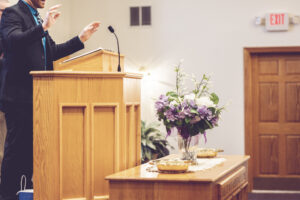
Just keep casting your line
I’m not what you would consider a man of the outdoors, but I did my fair share of fishing during my teen years.

I’m not what you would consider a man of the outdoors, but I did my fair share of fishing during my teen years.

Adobe Stock Photo. Do not publish.
The 20th century political anarchist Edward Abbey loved the desert and once observed, “What draws us into the desert is the search for something intimate in the remote.” Abbey was not the only person who discovered intimacy in the solitude of the desert. The same could be said for some of the most influential people of prayer mentioned in Scripture. God originally created man in a garden, but He frequently recreates them in a desert.

a golfer blasts his ball from the sand trap
I have tried really hard to like golf, but I prefer hobbies that do not tempt me to say or do things I will regret later. One thing I do like about golf is the mulligan—a do-over stroke that doesn’t count. They make those terrible shots disappear into thin air.

Adobe Stock Photo. Do not publish.
For many pastors, it’s difficult to not take it personally when people leave their church. But according to a recent Lifeway Research study, most churchgoers aren’t leaving a church because they have a personal complaint against the pastor. During the research screening process, it was determined only 53% of U.S. regular churchgoers say they have attended more than one church as an adult. Among these, most say their church change was impacted by a residential move (60%). Still, 40% of church changes were driven by something other than a residential move.
I get it. Numbers are not everything. Indeed, numbers are not the most important thing. But a balanced use of numbers can be helpful.
It is strange to write about the death of the Baby Boomers because I am one of them. Indeed, this article was a reminder of my own mortality.
While we continue to see reports of denominational decline in America, we see fewer reports of the growth of non-denominational churches. It is actually an amazing story.
The two leading presidential candidates in the polls today are 81 years old and 77 years old. Bob Iger returned to Disney as CEO. He will be 73 years old in February. What about pastors? Are they retiring later in ministry?
For hundreds of thousands of churches, the tradition stood the test of time. The majority of churches passed the offering plate (or some type of receptacle) during a designated time of the worship service typically called “the offertory.”
The metaphor has changed. For most of my ministry, we often referred to the up and down of pastoral ministry as a roller coaster. It made sense. One day the pastor will celebrate five new believers in Christ. The next day the pastor is met by a long-term church member who is leaving the church because she is not getting fed (I really loathe that excuse to leave.).
There is no shortage of pundits who are providing to us the gloomy and dismal state of American congregations, and, indeed, of many churches around the world. For sure, I am among the guilty. While personal evangelism is ultimately a heart issue between Christians and God, we do see ways this disobedience to the Great Commission is manifesting itself.
FRANKLIN, Tenn. (BP) -- It is one of the most common questions we get from church leaders: When will all the church members return to in-person services?
Thom Rainer marvels at the positive use of social media for God's glory during the disappearance of Christian author Henry Blackaby.
Churches can learn lessons from the cover-up of child abuse at Penn State, says columnist and LifeWay President Thom Rainer.